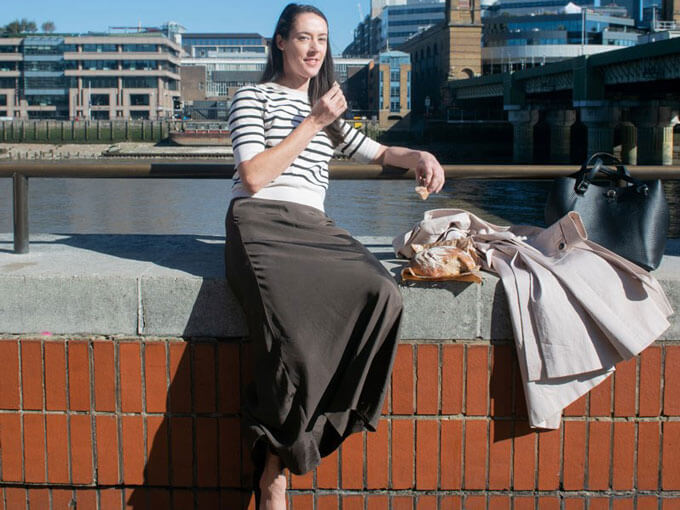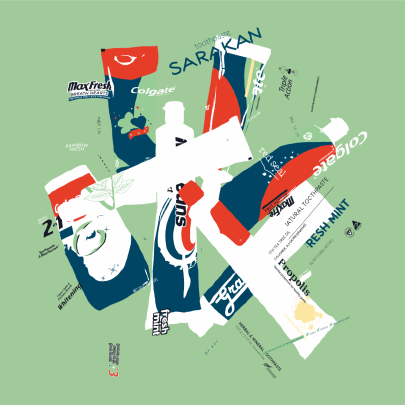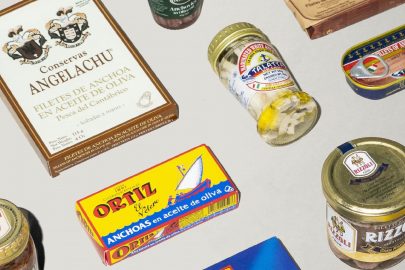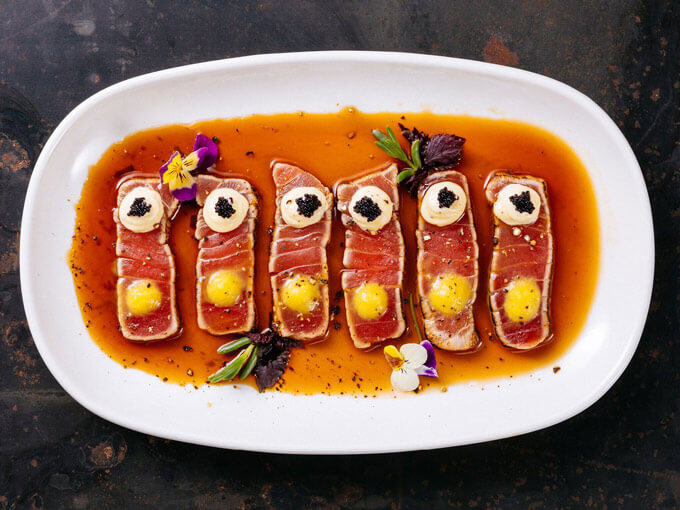Apr 9, 2019 etc
Auckland born, award-winning pastry chef Heather Kaniuk talks to Brian Ng about working for Gordon Ramsay, being the only woman in an industrial kitchen – and missing home after years away in London.
Kaniuk, 32, was the perfect guide, as a former executive pastry chef at two five-star London hotels: the Mandarin Oriental Hyde Park and the Shangri-La at The Shard.
The Aucklander – and Westie – was 19 when she first landed in London on a NZ-UK Link Foundation scholarship, via her chef’s apprenticeship at Auckland’s Stamford Plaza Hotel and Peter Gordon’s Dine restaurant. From there, she worked her way through some of the world’s most-famous eateries, including a stint at The French Laundry in California’s Napa Valley and a year at Gordon Ramsay’s restaurant Maze in London.
Nowadays, Kaniuk works at her consultancy firm Smart Patisserie alongside her partner (in life and business) Graham Hornigold. They first met in 2013 – over pastries, unsurprisingly – when they were both working at the London division of global hospitality business Hakkasan Group. Hornigold was head of the company’s pastry division, Kaniuk his second-in-command.
The couple’s latest venture is Longboys, a London-based gourmet doughnut and coffee business. But they are in demand worldwide, too, with Smart Patisserie’s projects already spanning Europe and the Middle East. When I caught up with Kaniuk to talk about her international career and Kiwi cooking launch pad, she was in Doha, Qatar, where she was setting up a restaurant and bakery.
What was it like working at Maze?
Maze was a brilliant experience in terms of working in a high-pressure, fast-paced environment. At the time, when it had just opened, it was at the forefront of London’s dining scene, and the food was innovative and precise.
It was my first experience working in a large kitchen brigade. We had a team of 30 chefs – only two women – so it was a very masculine environment. It was headed by Jason Atherton and overseen by Gordon Ramsay, both known to be among the toughest chefs of their time. You had to be strong to survive. The days often exceeded 16- to 18-hour shifts, 10 days in a row.

You had to arrive early, in order to gather all the ingredients you needed for that day, as well as pots, pans, utensils. If you didn’t get them early, you wouldn’t have them, and you risked a bollocking later if you weren’t set for service.
The stress, and the mental and physical exhaustion took its toll. You tended not to learn people’s names in the first month, until you were sure they could handle the pressure; most lasted only days or weeks. At the same time, we had a long line of people wanting to work there, along with a constant stream of stagiaires [unpaid interns]. Positions were quickly filled.
How did you end up at The French Laundry working for chef and owner Thomas Keller?
When I moved to San Francisco [in 2012], I ended up in hospital, diagnosed with an autoimmune disease. After a few months struggling to make headway within the US medical system, I was transferred to a top endocrinologist. I needed to have months of treatment but only had a one-year work visa, and he was concerned I wouldn’t be able to have continuous treatment if I had to leave the States.
At one consultation, he mentioned one of his old university friends was Thomas Keller, and that he might be able to help me with the visa. So I went to The French Laundry, did my working trial, and was offered a position. They applied for my visa, and in the meantime, I was able to stage [intern] with them. The visa application was rejected, and I ended up having to leave the country. This was probably one of the most disheartening experiences. I desperately wanted to keep working there.
“At Ramsay’s restaurant Maze, the days often exceeded 16- to 18-hour shifts, 10 days in a row.”
I loved their kitchens. They were immaculate: it was organisation taken to a new level. Each section was thoughtfully designed, with everything you needed within reach. You would open a drawer and a set of knives in descending order of size would be perfectly laid out. After my earlier experiences in London kitchens, everything there worked like clockwork; everyone knew what they needed to be doing. There were additional buildings around the restaurant, so there were kitchens for bakery, pastry, prep, stores; it took a little while to learn your way around. Everyone was incredibly polite, everyone said “Hello” or “How are you?” when they walked past.
I tried dishes that were exquisite, saw new techniques, learned about heritage ingredients grown on the grounds. It really opened my mind to a different way of cooking, of thinking. Quite simply, it was the difference between being at the ballet and a boxing match!
You started off rotating stations, so what made you settle into pastry?
I was at Maze when I moved into pastry fulltime. Not only was the only other female in the brigade working in pastry, but it was a much calmer environment. There was less chance of pans being thrown at your head. I had always had an affinity for pastry – both making and eating it – and the precision and chemistry-based approach appealed to me. Also, the cooler temperatures!
Working my way up, I took roles for specific reasons, ensuring each one would teach me a new range of skills, or involve a higher level of execution than the one before. In this way, I worked through many respected kitchens, both fine-dining and five-star hotels, eventually taking on executive roles. I believe hard work and determination can get you anywhere, and having goals to drive you. Now, with Smart Patisserie, Graham and I consult on projects and new openings around the world, sharing our knowledge and training others.
What do you like about working in pastry?
I really enjoy the technical aspects of patisserie, which is what led me to leave the “hot kitchen” for the pastry. Patisserie, in its more refined form, is a precise art that encompasses science, chemistry and mathematics; it also requires good organisation skills. You need a thorough understanding of your ingredients and processes, how they will react with each other and why. Simple pastries, like a choux, can take years to master and perfect, although the recipe and process are very simple. A baguette, for example, has only four ingredients, but the results can vary hugely depending on how you treat the dough, which in itself is a living product. A croissant requires many processes and steps, as well as managing dough temperature, lamination, proving and baking. Small errors can hugely change the quality of your outcome.
Given you’re capable of whipping up all manner of goodies, what’s your favourite pastry to buy?
Honestly, I don’t really buy many pastries. If I’m going to eat something sweet, it’s probably a pack of Pineapple Lumps or Cadbury’s Black Forest .

What got you into cooking?
I cooked a lot as a child, first baking, then delving into basic cookery and home meals. My parents were happy for me to try different foods and cuisines, so I experimented with curries, Spanish and Middle Eastern dishes – cuisines that weren’t typical in New Zealand at that time. My parents’ pantry was forever being filled with new and exotic ingredients.
I was also lucky to have excellent home economics teachers who made me believe being a chef could be a great career. I’d previously been told by the careers counsellor that cheffing was not something to aspire to. The home economics teachers allowed me a lot of freedom to try recipes and compete in culinary competitions. I’d often pick recipes that were more complex than those assigned. They’d let me continue cooking through lunch break and into other classes so I could finish my dish. I recently returned to my college, and one of the teachers told me at one point I had an obsession with making the perfect lemon meringue pie. Apparently, I tried many versions, including a chocolate one. It was probably pretty terrible, but I’m glad they let me find my own way!
You left for the UK at a young age and never really looked back. Would you recommend young chefs follow in your footsteps?
The NZ-UK Link Foundation Award gave me the opportunity to travel to the UK after I finished my chef apprenticeship. It also allowed me to work in some truly amazing kitchens in and around London, including L’Ortolan, Aubergine and Maze – all Michelin-starred restaurants. It was an eye-opening experience; at the time I wouldn’t have been able to experience that level of cooking in New Zealand.
Fast forward 15 years, and these days the food scene at home is simply incredible, with many talented Kiwi chefs such as Ben Bayly, Michael Meredith, Josh Emett and Phil Clark, who’ve returned from working abroad and helped to reinvent the food scene. There’s also a growing number of talented chefs from overseas settling in New Zealand – like Lisa Crowe, Dan Pearson and Rensha Bouwer.
New Zealand offers many opportunities for young chefs to develop and flourish. When I was last in Auckland, I spent some time at the AUT hospitality and tourism school, which has a world-class training facility. The increased importance of the hospitality sector on the economy has driven more investment in these areas. However, more funding is required to help bring overseas talent to New Zealand and expose young chefs to modern techniques and to broaden their horizons.

How would you recommend chefs get their overseas experience now? Through staging?
I’ve staged a lot during my career, both formally and informally, and I believe you can learn so much through undertaking short sojourns in another kitchen. As a chef, you never finish learning, and it’s necessary to stay up to date with current trends and learn new techniques, which you may not be able to do in your own workplace. So staging is a great way to keep learning. That said, there are a few places that treat stagiaires as free labour.
The hospitality industry worldwide has a shortage of quality staff, and as the workforce tends to be quite transient, it’s generally easy to find a job anywhere in the world if you’re professional and skilled. And there are plenty of opportunities for chefs to be paid to see the world, whether as a private chef, or through superyachts, cruise ships, luxury resorts and the like.
Kitchens are one of the few places where you can get by without being fluent in the local language, as it’s a practical job with lots of repetition. Some of the best and most loyal chefs who have worked for me joined without speaking English; while they picked it up along the way, it was their passion to learn and succeed that was far more important to me than their command of the language.
You say you’d prefer not to be based in Auckland when you decide to move back to New Zealand. Why’s that?
I grew up in West Auckland. I love it, and it holds many special memories for me. My [teacher] parents have recently retired and moved to the Bay of Plenty, and since I’ve not lived in New Zealand for my entire adult life, it would be great to be close to my family. I feel like a fraud saying “family means everything” since I’ve been overseas for 14 years, but I do intend to come home soon-ish.
After living in London for so many years, I’d love to return to a slightly quieter and more balanced lifestyle. New Zealand is an amazing place to raise a family, and it’s blessed with stunning countryside. So perhaps the Bay of Plenty, or maybe Queenstown or Wanaka. But my homecoming will definitely be somewhere I can enjoy the great outdoors.
Do you think high-end restaurants can flourish in New Zealand’s regional centres?
The trend these days is towards more casual eateries – a trend I welcome. Good food comes at many levels; it doesn’t need to be pricey or over-done, it just needs to suit the audience and setting. The misconception can be that “high-end” equals better; it’s often untrue. The best food can be the simplest: making use of quality produce and presenting it in a way that highlights its natural flavour, rather than masking or detracting from it.
There are many incredible restaurants, cafes and wineries in small towns and off-the-beaten-track destinations. Some of my favourites include the Okere Falls Store [on the shores of Lake Rotoiti, near Rotorua] and Luke’s Kitchen in Kuaotunu [Coromandel Peninsula]. Their bacon-and-egg pie is legendary. It converted my London-born partner to this Kiwi favourite!
Photos of Heather Kaniuk taken by Brian Ng. All other photos: Getty.
This article was first published in the March 2019 issue of North & South and published on Noted.co.nz.






